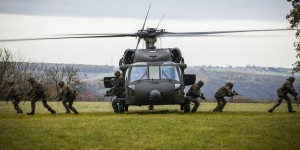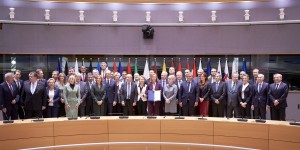Check against delivery!
Thank you very much.
We had yesterday a joint session with the Defence and the Foreign Ministers of the 28 Member States and today we had the Council with Defence Ministers where we also hosted NATO Secretary-General Jens Stoltenberg again. I will come to our cooperation with NATO in a moment.
Let me start by saying that yesterday afternoon and this morningMinisters took another major step in our work to build the European Union of defence. We have agreed yesterday to first of all strengthen our civilian crisis management. Ministers adopted a civilian compact that contains over 20 political commitments toreinforce the European Union capacity to deploy civilian expertise.
We have many EU civilian missions, 10 at the moment, but over time we have had 22 civilian missions around the world. I visited many of them. They are extremely appreciated by our partners, because they help building capacities and strengthening institutions and working on preventing and managing crises all around the world. It is a unique instrument that only the European Union has in that way. And the decision to strengthen this first of all highlights that as we work on the military side we also work on the civilian side of security. And this would also allow to strengthen civilian military cooperation on the ground that is one of our – again – unique tools that are extremely appreciated and needed in the current security situation.
The Ministers also took another important decision exactly one year after we launched thePermanent Structured Cooperation [PESCO]: they have agreed on 17 new projects that were adopted today. So in total we now have 34 Permanent Structured Cooperation projects. This shows that as Member States work on the implementation of the first round of projects that they have adopted, they have also come up with other proposals and this will help the European Union Member States to develop new capabilities. This is extremely important, because as you know strengthening European Union Member States capabilities also means contributing to the burden-sharing of the Trans-Atlantic Alliance. And this is why, I believe, NATO’s Secretary-General [ Jens Stoltenberg] today expressed full support to the work that we are doing in the field of security and defence. Because, as I said, if there is one way in which the European Union can contribute to Europeans taking more responsibility on defence, it is through more cooperation and more coordination among us.
Another important decision that was taken was the launch of the Coordinated and Annual Review on Defence as a standing exercise, starting with the first cycle of Coordinated Annual Review on Defence for the years 2019/2020. And that helps, in concrete terms, to coordinate national defence planning and identify opportunities for cooperation and joint investments among Member States. I know it sounds technical but it is extremely important when it comes to the actual work on the planning.
And then, the last element of the package, a very substantial one: the decision was taken to strengthen theMilitary Planning and Conduct Capability by 2020. It should be ready to also run a smaller-scale executive operation of about 2,500 soldiers alongside the responsibility it is exercising already for the military training missions of the European Union. In this way, the Military Planning and Conduct Capability that is here in Brussels will also be able to strengthen its cooperation with its civilian counterpart, the Civilian Planning and Conduct Capability and other EU actors.
So we are continuing in strengthening our work in a consistent manner with good results. And I want to underline once again these decisions are taken at unanimity. We are still 28 [Member States], we are moving forward. We are turning all these decisions into concrete steps.
And this will also be accompanied by parallel decisions on the future budget. For the next Multi-annual Financial Framework there is a very substantial financial proposal on the table to accompany this work that has been started with resources, I have also put on the table the proposal of creating a European Peace Facility to improve the way in which we can finance our military operations, our military assistance to our partners and to give more predictability to our work on defence. This is going to be discussed in the coming weeks and months as we discuss also the next MFF [Multi-Annual Financial Framework].
Two words on our cooperation with NATO: As I said, we probably would have not managed to do all of this in the European Union, if it was not for a strong support and the strong coordination with NATO. Some of the projects under PESCO – think of military mobility – also respond to NATO needs and priorities and it is not by chance that as we strengthened the EU defence work, we have also strengthened in an unprecedented way our cooperation with NATO. We are in particular working on military mobility, but also on hybrid threats and other issues. So it is overall, I think, a good story of a strengthened partnership. And the NATO Secretary-General [Jens Stoltenberg] today, I think, was very clear in showing his support to the work that we are doing and the way in which this is also strengthening the Alliance.
Last but not least, we had with the Ministers an update on our missions and operations around the world. We focused in particular on three priorities. One is the work we are doing in the Sahel. We are regionalising our presence in the Sahel, making sure that we support the G5 Sahel and bilaterally all the countries of the region – from Mali to Niger, to the others – to invest in our own security by strengthening their capacities to tackle terrorism, on one side, and organised crime on the other. This is an investment in our own security. We also focused on our work in the Balkans that remain a priority for us, and also onOperation [EUNAVFOR MED] Sophia.
You know that the [mandate of the] Operation needs to be renewed by the end of the year. There are discussions ongoing; it was very frank discussions. I am confident that Member States will use the few still remaining weeks to find a consensus on the way forward. I can tell you very clearly that there was full unanimity around the table on the need to continue Operation Sophia, for it to be fully operational, because it is bringing good results: it is diminishing the number of arrivals, it is arresting smugglers, it is neutralising vessels, it is training the Libyan coastguards and most importantly, it is also implementing UN Security Council resolutions on the arms embargo [against Libya]. So it is contributing to the security of Europeans, to the security of the Mediterranean Sea in an unprecedented way.
It is also a clear demonstration of the fact that the European Union is a security and defence player in an area that is a priority for us and for the security of our citizens, and where we have clearly the predominant role, because if you look at the Mediterranean Sea, it is the European Union at sea and not others.
I clearly said to the [Defence] Ministers that they either find an interim solution on the issue of disembarkation within the next couple of weeks, or we will need to dismantle the Operation and the Operation will come to an end. Everybody said that this is an option that needs to be avoided in all ways. I would now expect Ministers to instruct their ambassadors in the PSC [Political and Security Committee] to work on an interim solution for this particular aspect of the Operation, so that the Operation can continue.
In the absence of that unanimous and consensual decision, the Operation will come to an end and this would mean no presence at sea from the European Union in the Mediterranean, no training of the Libyan coastguards, no dismantling of the networks of smugglers, no arrests of smugglers by the European Union, no authorisation of vessels, no arms embargo implementation and so on and so forth. But again, Ministers seemed committed to work seriously on that and so I expect them to deliver now.
Link to the video: https://ec.europa.eu/avservices/video/player.cfm?ref=I163715



